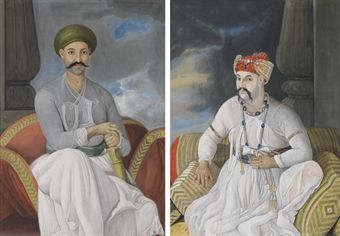"A PORTRAIT OF PRINCE MIRZA JAWAN BAKHT, COMPANY SCHOOL, LUCKNOW, INDIA, CIRCA 1786; watercolour and gouache on card, with a seated figure dressed in white with green waist sash and turban, holding a sheathed sword, unframed; inscriptions: in ink on the reverse in Urdu: 'the likeness of Mirza Jewan Bakhat'.
This portrait is after a painting of the Mughal prince Jawan Bakht, which was attributed to the celebrated Scottish artist Charles Smith. Smith was a contemporary of Johann Zoffany, and an adventurer-artist who travelled widely throughout India under the protection of his country-man, the Governor-General, John Macpherson. Macpherson, whose arrival in 1785 guaranteed work for Smith, introduced the artist to the Nawabs of areas far removed from central British rule. In this way oil portraits were commissioned from Smith by such Indian dignitaries as the Nawab of Oudh, Asaf-ud-Daula, and the present sitter, Jawan Bakht.
Zoffany is recorded as having produced several portraits of Jawan Bakht, yet only a simple sketch of the Prince within a group portrait has survived. This large, three-quarter length oil painting in a different hand from Zoffany's is however extant today, and is believed to have been executed by Charles Smith (Archer 1979, p.181, no.111). The painting exhibits various features of the latter artist's style, such as the characteristic, unadorned simplicity. Most tellingly however is the portrait's similarity to a miniature by the artist Ozias Humphry (1742-1810), who was concurrently painting miniatures of Smith's patrons at the Nawab's court (Archer 1979, p.186, no.115). This lot is closely comparable to the original oil painting, which was last recorded by Mildred Archer as hanging in an Indian private collection (Archer 1979, p.451, note.4).
Prince Jawan Bakht was the eldest son of the Mughal Emperor Shah Alam, who visited Lucknow in 1784 to ask Warren Hastings' help in freeing his father from the Mahrattas. Hastings wrote that he found the Prince "gentle, lively, possessed of a high sense of humour, of a sound judgement, an uncommonly quick penetration, and a well-cultivated understanding, with a spirit of resignation and an equality of temper almost exceeding any within reach of my own knowledge or recollection"."





